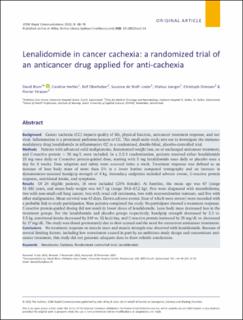Please use this identifier to cite or link to this item:
https://doi.org/10.21256/zhaw-24208Full metadata record
| DC Field | Value | Language |
|---|---|---|
| dc.contributor.author | Blum, David | - |
| dc.contributor.author | Hertler, Caroline | - |
| dc.contributor.author | Oberholzer, Rolf | - |
| dc.contributor.author | de Wolf-Linder, Susanne | - |
| dc.contributor.author | Joerger, Markus | - |
| dc.contributor.author | Driessen, Christoph | - |
| dc.contributor.author | Strasser, Florian | - |
| dc.date.accessioned | 2022-02-10T14:51:12Z | - |
| dc.date.available | 2022-02-10T14:51:12Z | - |
| dc.date.issued | 2022 | - |
| dc.identifier.issn | 2617-1619 | de_CH |
| dc.identifier.uri | https://digitalcollection.zhaw.ch/handle/11475/24208 | - |
| dc.description.abstract | Background: Cancer cachexia (CC) impacts quality of life, physical function, anticancer treatment response, and survival. Inflammation is a prominent pathomechanism of CC. This small-scale study sets out to investigate the immunomodulatory drug lenalidomide in inflammatory CC in a randomized, double-blind, placebo-controlled trial. Methods: Patients with advanced solid malignancies, documented weight loss, no or unchanged anticancer treatment, and C-reactive protein>30 mg/L were included. In a 2:2:1 randomization, patients received either lenalidomide25 mg once daily or C-reactive protein-guided dose, starting with 5 mg lenalidomide once daily or placebo once a day for 8 weeks. Dose adaption and safety were assessed twice a week. Treatment response was defined as an increase of lean body mass of more than 2% in a lower lumbar computed tomography and an increase in dynamometer-assessed handgrip strength of 4 kg. Secondary endpoints included adverse events, C-reactive protein response, nutritional intake, and symptoms. Results: Of 24 eligible patients, 16 were included (25% female). At baseline, the mean age was 67 (range 51–88) years, and mean body weight was 64.7 kg (range 39.8–87.2 kg). Five were diagnosed with mesothelioma, two with non-small-cell lung cancer, two with renal cell carcinoma, two with neuroendocrine tumours, and five with other malignancies. Mean survival was 43 days. Eleven adverse events (four of which were severe) were recorded with a probable link to study participation. Nine patients completed the study. No participant showed a treatment response. C-reactive protein-guided dosing did not result in lower doses of lenalidomide. Lean body mass decreased less in the treatment groups. For the lenalidomide and placebo groups respectively, handgrip strength decreased by 2.3 vs.5.5 kg, nutritional intake decreased by 249 vs. 32 kcal/day, and C-reactive protein increased by 35 mg/dL vs. decreased by 17 mg/dL. The study was closed prematurely due to slow accrual and the need for concurrent anticancer treatments. Conclusions: No treatment response on muscle mass and muscle strength was observed with lenalidomide. Because of several limiting factors, including low recruitment caused in part by an ambitious study design and concomitant anti-cancer treatment, this study did not generate adequate data to draw reliable conclusions. | de_CH |
| dc.language.iso | en | de_CH |
| dc.publisher | Wiley | de_CH |
| dc.relation.ispartof | JCSM Rapid Communications | de_CH |
| dc.rights | https://creativecommons.org/licenses/by-nc-nd/4.0/ | de_CH |
| dc.subject | Neoplasm | de_CH |
| dc.subject | Lenalidomide | de_CH |
| dc.subject | Cachexia | de_CH |
| dc.subject | Randomized controlled trial | de_CH |
| dc.subject.ddc | 616: Innere Medizin und Krankheiten | de_CH |
| dc.title | Lenalidomide in cancer cachexia : a randomized trial of an anticancer drug applied for anti‐cachexia | de_CH |
| dc.type | Beitrag in wissenschaftlicher Zeitschrift | de_CH |
| dcterms.type | Text | de_CH |
| zhaw.departement | Gesundheit | de_CH |
| zhaw.organisationalunit | Institut für Pflege (IPF) | de_CH |
| dc.identifier.doi | 10.1002/rco2.54 | de_CH |
| dc.identifier.doi | 10.21256/zhaw-24208 | - |
| zhaw.funding.eu | No | de_CH |
| zhaw.issue | 1 | de_CH |
| zhaw.originated.zhaw | Yes | de_CH |
| zhaw.pages.end | 76 | de_CH |
| zhaw.pages.start | 68 | de_CH |
| zhaw.publication.status | publishedVersion | de_CH |
| zhaw.volume | 5 | de_CH |
| zhaw.publication.review | Peer review (Publikation) | de_CH |
| zhaw.author.additional | No | de_CH |
| zhaw.display.portrait | Yes | de_CH |
| Appears in collections: | Publikationen Gesundheit | |
Files in This Item:
| File | Description | Size | Format | |
|---|---|---|---|---|
| 2022_Blum-etal_Lenalidomide-cancer-cachexia_JCSMRapidComm.pdf | 2.51 MB | Adobe PDF |  View/Open |
Show simple item record
Blum, D., Hertler, C., Oberholzer, R., de Wolf-Linder, S., Joerger, M., Driessen, C., & Strasser, F. (2022). Lenalidomide in cancer cachexia : a randomized trial of an anticancer drug applied for anti‐cachexia. JCSM Rapid Communications, 5(1), 68–76. https://doi.org/10.1002/rco2.54
Blum, D. et al. (2022) ‘Lenalidomide in cancer cachexia : a randomized trial of an anticancer drug applied for anti‐cachexia’, JCSM Rapid Communications, 5(1), pp. 68–76. Available at: https://doi.org/10.1002/rco2.54.
D. Blum et al., “Lenalidomide in cancer cachexia : a randomized trial of an anticancer drug applied for anti‐cachexia,” JCSM Rapid Communications, vol. 5, no. 1, pp. 68–76, 2022, doi: 10.1002/rco2.54.
BLUM, David, Caroline HERTLER, Rolf OBERHOLZER, Susanne DE WOLF-LINDER, Markus JOERGER, Christoph DRIESSEN und Florian STRASSER, 2022. Lenalidomide in cancer cachexia : a randomized trial of an anticancer drug applied for anti‐cachexia. JCSM Rapid Communications. 2022. Bd. 5, Nr. 1, S. 68–76. DOI 10.1002/rco2.54
Blum, David, Caroline Hertler, Rolf Oberholzer, Susanne de Wolf-Linder, Markus Joerger, Christoph Driessen, and Florian Strasser. 2022. “Lenalidomide in Cancer Cachexia : A Randomized Trial of an Anticancer Drug Applied for Anti‐Cachexia.” JCSM Rapid Communications 5 (1): 68–76. https://doi.org/10.1002/rco2.54.
Blum, David, et al. “Lenalidomide in Cancer Cachexia : A Randomized Trial of an Anticancer Drug Applied for Anti‐Cachexia.” JCSM Rapid Communications, vol. 5, no. 1, 2022, pp. 68–76, https://doi.org/10.1002/rco2.54.
Items in DSpace are protected by copyright, with all rights reserved, unless otherwise indicated.